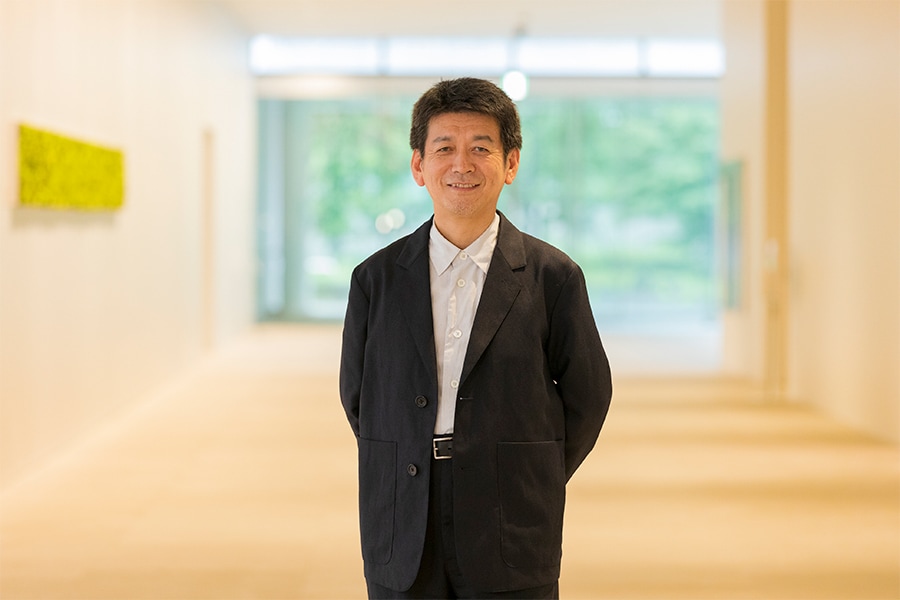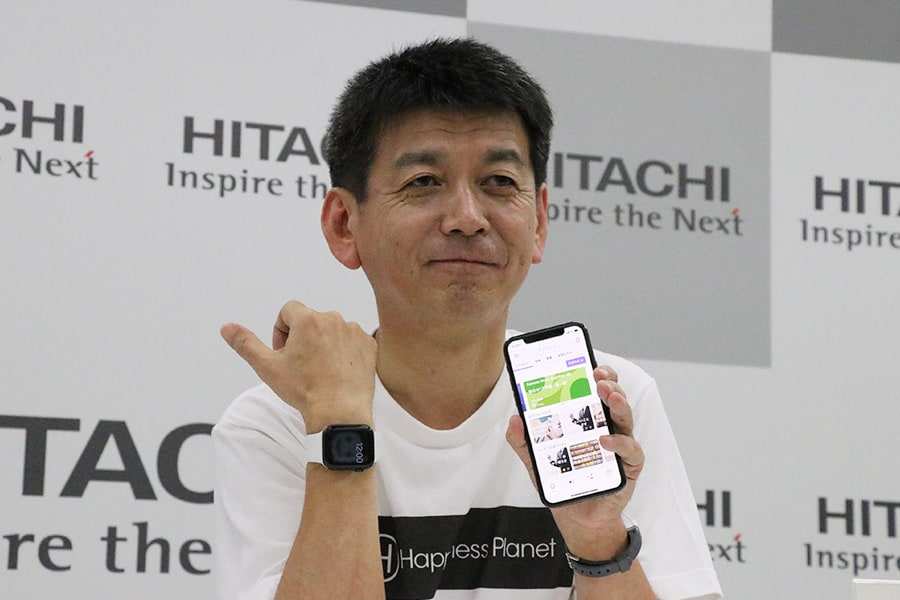Digital Twin: What Does This Mean and How is Hitachi Using This Technology?
The People of Hitachi: A researcher's ambition to create happiness in the workplace
- Table of Contents
-
- An app that promotes mutual support among employees
- A major turning point in his career
- Encounter with positive psychology
- Research reveals features of a happy organization
- Triangular relationships observed in a happy organization
- Working in a state of happiness
- An app that inspires positivity in users
- Changing Japan's corporate organization
"Happiness improves personal productivity, and this also has a direct connection to the economy," says Kazuo Yano, Fellow at Hitachi. Kazuo is also the chairman of the board and CEO of Happiness Planet, Ltd., a venture company established and invested by Hitachi.
Happiness Planet, Ltd. provides an app developed by Kazuo called "Happiness Planet." This app aims to help make working people happy while contributing to team building and improvement in productivity.
An app that promotes mutual support among employees
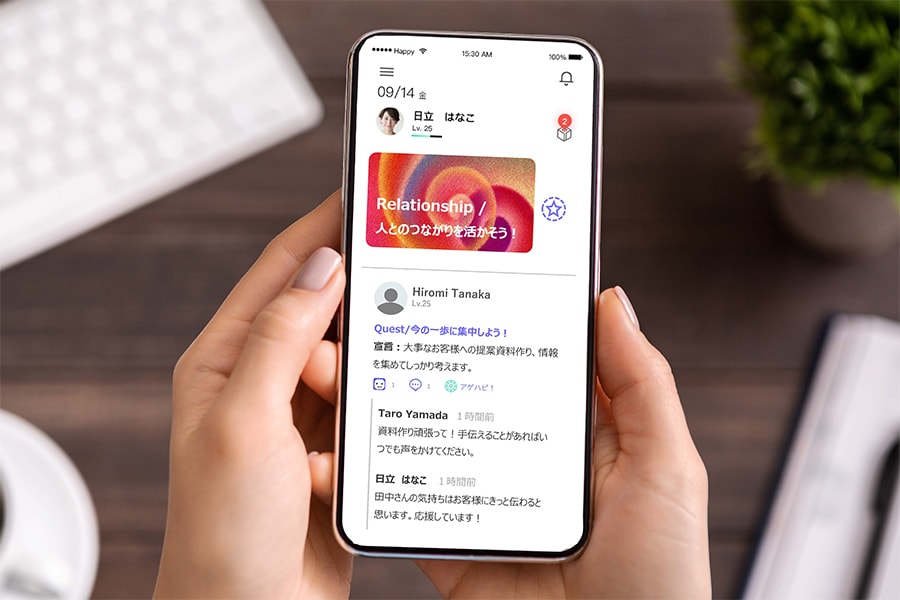
The Happiness Planet app adds positivity to the individual’s working style. When the user starts up the app on a computer or smartphone in the morning before work, a theme selected randomly from 16 variations is presented. Examples of these include "Passion: Don’t think, just do!" and "Trust: Don’t be afraid to rely on those around you."
Users can make comments of up to 20 characters in response to these themes. Then, your team members (selectively formed as teams of 3) who read your comment can then send back support messages, such as "I can advise you on that concern" or "Your steady efforts are crucial to our teamwork."
This app is configured to automatically switch team members every week. Support messages from members help raise employees’ motivation, and mutual connections are naturally created between those who usually don’t. Kazuo points out that this is what leads to improvements in productivity.
"In actual business, most communication involves only such matters as reports, instructions, requests, and responses. The passion, enthusiasm, and determination of the person for the job are not valued very much. In a sense, this can be seen as a workstyle in which people are viewed as cogwheels in the work process. Such organizations will have difficulty in drawing out the capacity to approach challenges positively in times of radical change, such as now."
A major turning point in his career
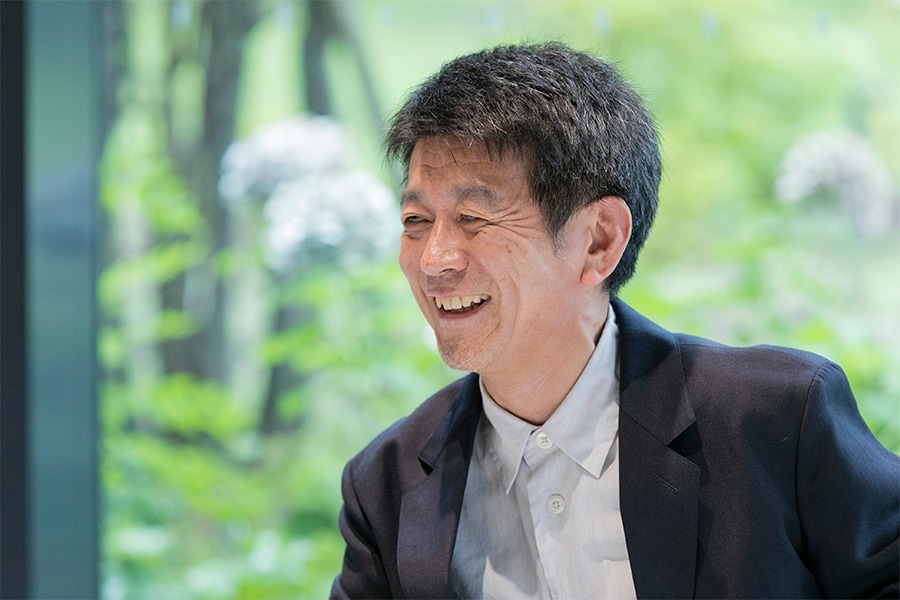
Kazuo developed Happiness Planet as a consequence of a major turning point in his career.
Kazuo originally studied theoretical physics at university, and in 1984 joined Hitachi, Ltd. as a semiconductor researcher. Looking back on his reason for joining the company, he said: "As my family ran a Japanese-style inn, I wanted just once to try working at company as an employee."
In the next 40 years of his life in research, he has applied for over 350 patents and received many international awards. These achievements also brought recognition from within the company, and in 2018 he became one of a few employees to ever by awarded the title of "Fellow."
Then, in 2003, Kazuo, who had been entirely devoted to the research & development of semiconductors since joining the company, encountered a major turning point: Hitachi came to the sudden decision to withdraw from the semiconductor business. Speaking on the shock he felt at the time, he said that, "I did not know how to make sense of this abrupt loss of everything that I had put my heart and soul into these past 20 years."
As his wife Fumiko recalled, "My husband was always positive, cheerful, and optimistic about work. So although he looked to be in a state of shock at the time, I felt that he would somehow overcome it."
Encounter with positive psychology
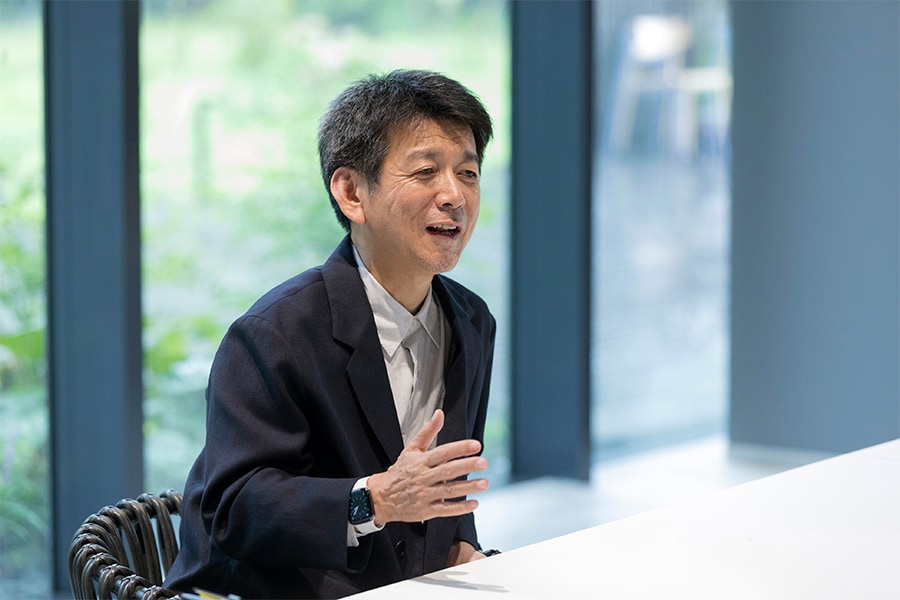
What came out of this was Kazuo’s next job to develop a new business. He spent considerable time in multiple discussions on this with his semiconductor research colleagues.
In the midst of this, Kazuo’s attention was caught by “positive psychology”, a field of scientific investigation and research in happiness. Such study has shown that people who feel happy are more productive and that companies with many such people produce higher profits.
Compared to people who do not feel happy, people who do feel happy have 30% higher rate of sales orders, a 300% increase in creativity, and about a 50% lower rate of leaving their jobs on average. It has also been reported that, in a comparison of companies with a happy workforce and those without, there was a difference of 18% in earnings per share. Kazuo was instantly drawn to this fact.
Kazuo focused particularly on Sonja Lyubomirsky, professor of psychology at the University of California, Riverside, known for having verified the relationship between happiness and productivity. Wanting to hear what she had to say directly, he flew to the U.S. and paid her a visit at her university "as if on a cold call."
Upon meeting, Kazuo found much common ground with Professor Lyubomirsky. Together, they conducted joint research into methods of raising happiness levels that use technology and coauthored a pioneering paper that tied technology to happiness.
They arrived at the conclusion that "in the earnest pursuit of any business, ultimately it exists for the sake of people’s 'happiness,' leading to the idea that it is desirable to generate happiness through business."
Research reveals features of a happy organization
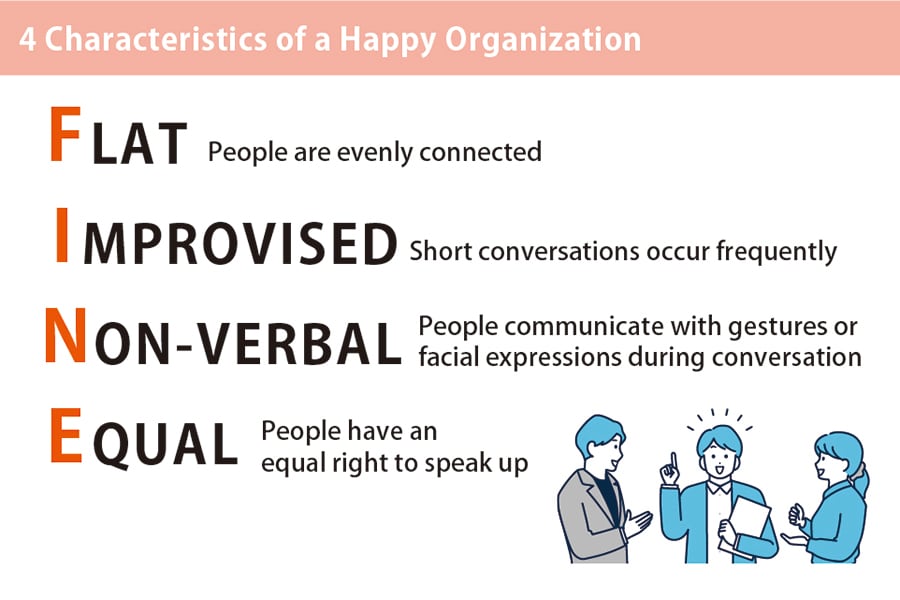
Once the direction of a new business was settled on, Kazuo began in 2006 a scientific study into the types of organizations that make people feel happy. He developed a sensor for observing the movements of people and analyzed their behavioral data.
"I started out with an idea that maybe I could quantify happiness and identify factors that make people happy."
This was then followed by 15 years of verification testing. An analysis of as many as 5 billion behavioral data points revealed the four characteristics (FINE) possessed by happy organizations.
These four characteristics are "Flat," meaning that relationships between people are equal; "Improvised," meaning that there is a high frequency of short conversations; "Nonverbal," meaning that the body moves during conversation; and "Equal," meaning that everyone has an equal right to speak. The 4 features are represented by the acronym of “FINE.”
Triangular relationships observed in a happy organization
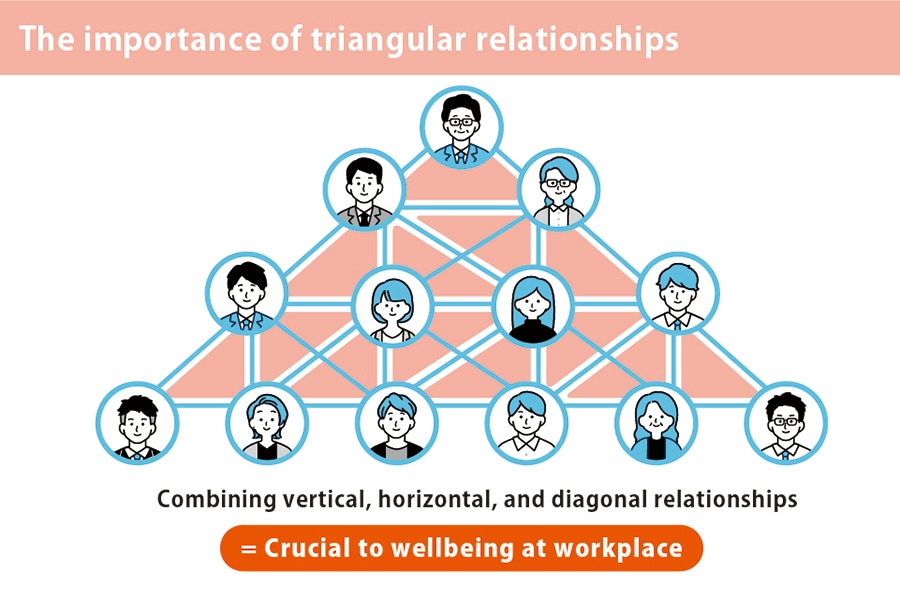
Kazuo's research made further important discoveries.
Joint research by Hitachi and the Tokyo Institute of Technology showed that a positive organization that has well-being (in a good state, mentally, physically, and societally) not only has vertical relationships between superiors and subordinates and the V-shaped relationships that arise based solely on business matters, but it also has triangular relationships that include horizontal and diagonal connections with colleagues.
"We also found that this went beyond professions and organizations and that it was universally true. The small difference between V-shaped and triangular produced a substantial difference."
A research paper on this was published in the renowned scientific journal, Nature/Scientific Reports, in June 2022.
"It is commonly thought that happiness is a relaxed state of ease. This accounts for the gap that many people feel between happiness and business. In fact, however, the power to create happiness is created from positive mental energy. Important to this is the building of triangular relationships in the workplace."
Working in a state of happiness
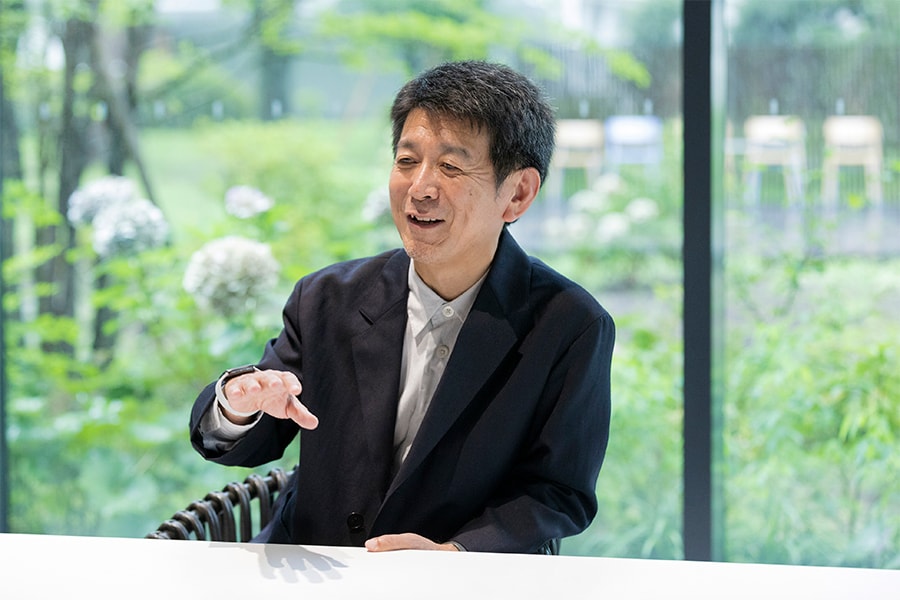
Kazuo, who has been scientifically analyzing the abstract concept of happiness, says that he himself has also been positively engaged in his work in a happy state.
His wife, Fumiko, said of her husband that, "He is by nature a positive-thinking person. Since a young man, the more problematic his work got, the more he would recite his mantra that ‘everything will be all right.’" Fumiko went on to say:
"At first, I thought it was all just show, but that's actually the way he is. To him, difficult circumstances are a chance for self-growth, and by overcoming them, he can be that much better than before."
Professor Tadahiro Kuroda, director of the Systems Design Lab, Graduate School of Engineering, University of Tokyo and an old acquaintance, praised his friend, saying:
"Kazuo is not just a star within Hitachi. He is a trailblazer of Japan. His work in research has been internationally cutting-edge. He always approaches his research with a sense of fun. There was a future that only he could see, and there were facts about happiness known by just a few worldwide. I think this is what was behind the establishment of his company and that he wanted to communicate this to others through business."
An app that inspires positivity in users
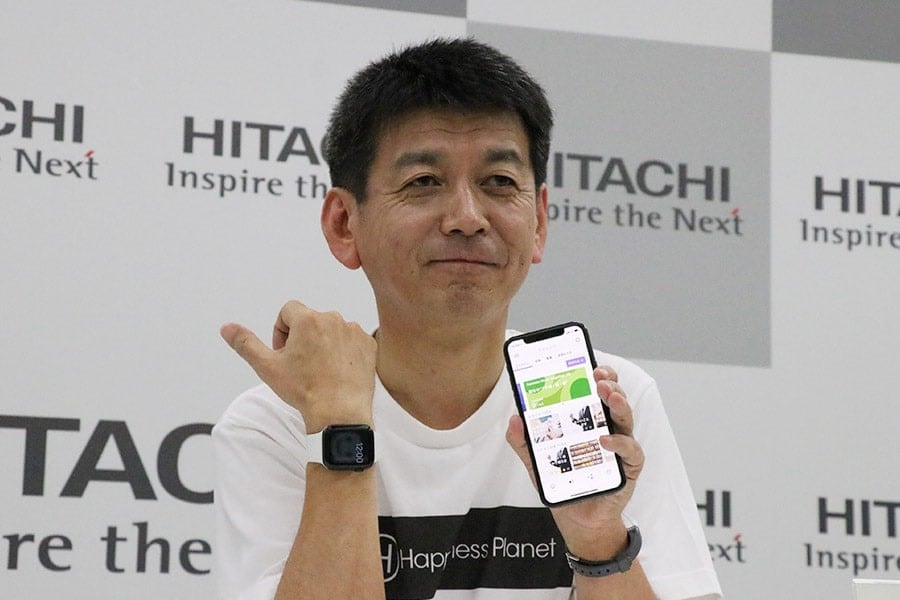
After 15 years of research, the app “Happiness Planet” was developed, and in the over six months since its launch in May 2022, roughly 130 companies have become its users.
In feedback from users of the app, they cited that they learned about who their colleagues were as people, that they became quicker to notice changes in the motivation or health of subordinates, and that they became capable of sharing worries.
The app is now being used in Hitachi's new employee training. The number of people who said they were able to experience a broadening of relationships with colleagues by using the app surpassed 80%.
Kazuo said: "People become positive about work, make connections with others, and grow. This produces new added value that is reflected onto the economy and that provides opportunities for more new challenges, leading to growth."
Changing Japan's corporate organization

Kazuo is now working on a new initiative for delivering the benefits of triangular relationships to as many people as possible. Called the "Happiness Planet Gym," this program implements learning and training for a variety of participating companies and organizations. He speaks directly to users online about the meaning of "creating a triangular relationship with colleagues." Although generally reserved, he speaks passionately about happiness at the Gym’s session.
"Happiness enhances productivity and creativity and makes for a healthy body and soul. Not only that, it helps prevent employee turnover and raises the value of company stock. Happiness is a skill, and it can be acquired through training."
This program has large numbers of participants from all over the country, including those from a variety of professions, such as the manufacturing industry, real estate and construction, healthcare providers, and financial institutions.
Kazuo hopes these activities and the app will lead increasing numbers of users to create triangular relationships, in this way changing workplace environments throughout the world into happier and more-productive places.
"Rather than becoming happy because work goes well, work goes well as a result of being happy. I hope to change the world's organizations into places full of connected, enthusiastic people."
Kazuo talks of turning all societal activities into something that creates happiness. Going forward, he will forge on with his challenge.
